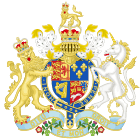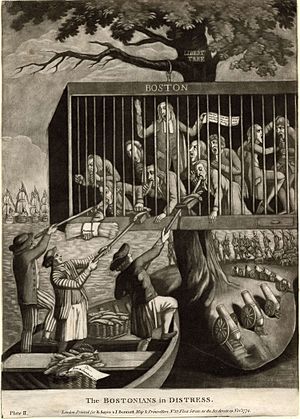Boston Port Act facts for kids

|
|
| Long title | An act to discontinue, in such manner, and for such time as are therein mentioned, the landing and discharging, shipping of goods, wares, and merchandise, at the town, and within the harbour, of Boston, in the province of Massachusetts Bay, in North America. |
|---|---|
| Citation | 14 Geo. III. c. 19 |
| Territorial extent | Province of Massachusetts Bay |
Quick facts for kids Dates |
|
| Royal assent | March 20, 1774 |
| Commencement | June 1, 1774 |
| Other legislation | |
| Relates to | Intolerable Acts |
|
Status: Repealed
|
|
| Text of statute as originally enacted | |
The Boston Port Act, also known as the Trade Act 1774, was a law passed by the Parliament of Great Britain. It became law on March 31, 1774, and started on June 1, 1774. This act was one of five laws passed in 1774 to punish the city of Boston. These laws are often called the Intolerable Acts. They were a direct response to the famous Boston Tea Party.
Why the Act Was Passed
The Boston Port Act was created because of the Boston Tea Party. During this event, American colonists threw many chests of tea into Boston Harbor. They were protesting British taxes.
King George III and the British government were very angry. They believed the colonists were trying to harm British trade. On March 18, 1774, Lord North introduced the Port Bill. This bill aimed to punish Boston.
The new law closed the Port of Boston. This meant no ships could load or unload goods there. The port would stay closed until Boston paid for the destroyed tea. They also had to pay for the lost tax money. The law also said that the government of Massachusetts Colony had to move to Salem. The nearby town of Marblehead became the new main port.
How the Act Became Law
At first, some British politicians who supported America thought the Act was fair. They believed Boston could end the punishment by paying for the tea. But soon, many members of the Whig party spoke out against the bill. Important figures like Edmund Burke argued against it.
Despite their efforts, the Act passed easily. It became a law on March 31, 1774.
What Happened After
After the Act passed, British warships started patrolling Boston Harbor. They made sure no ships used the port. The British Army also sent troops to Boston. Commander-in-Chief Thomas Gage led these soldiers.
Colonists felt that the Port Act was unfair. They said it punished thousands of innocent people. They also felt it took away their rights as British subjects.
The Port of Boston was very important for getting supplies. So, other colonies, like South Carolina, sent help to Massachusetts. They sent food and other goods. This support was so strong that Boston leaders even joked they might become the main grain port in America.
June 1, 1774, the day the Act began, was a sad day for many colonists. They observed it as a day of fasting and prayer. Bells rang, flags flew at half-mast, and houses were draped in black. This event helped bring the thirteen colonies closer together. It gave them a common cause to unite against.
Because of the Port Act and other similar laws, the First Continental Congress met. This meeting happened in Philadelphia on September 5, 1774. Its goal was to plan how the colonies would respond to these "Coercive Acts."
See also
 In Spanish: Ley del Puerto de Boston para niños
In Spanish: Ley del Puerto de Boston para niños
 | Kyle Baker |
 | Joseph Yoakum |
 | Laura Wheeler Waring |
 | Henry Ossawa Tanner |


